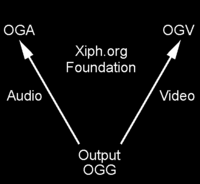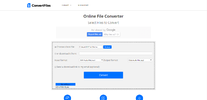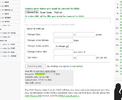User:Wildgoosespeeder/Help:Media: Difference between revisions
mNo edit summary |
m (→How to Embed) |
||
| Line 45: | Line 45: | ||
{{tem|multiframe}} and {{tem|multiple image}} can also be used, but it isn't recommended. | {{tem|multiframe}} and {{tem|multiple image}} can also be used, but it isn't recommended. | ||
===Browser Support=== | |||
{| class="wikitable" | {| class="wikitable" | ||
! Browser | ! Browser | ||
! Support OGG/OGA/OGV | ! Support OGG/OGA/OGV? ([[Wikipedia:HTML5|HTML5]]-compliant video streams) | ||
|- | |- | ||
| [[Wikipedia:Internet Explorer|Internet Explorer 9+]] | | [[Wikipedia:Internet Explorer|Internet Explorer 9+]] | ||
| Line 70: | Line 69: | ||
| Prompts for download | | Prompts for download | ||
|} | |} | ||
===Media Template=== | |||
There is an alternative to the traditional floating element, which is the {{tem|Media}} template, which, when properly set up, depending on the browser, will either show the audio or video or prompt the user whether to open or save the file. The template is meant to provide a neat format to present these files. Below is an example: | |||
{{media | {{media | ||
Revision as of 04:09, May 6, 2017
Super Mario Wiki has the ability to upload OGG files (with the extension of .ogv, .oga, or ogg) for audio and video purposes, in addition to the normal image function.
Wikipedia, and therefore all MediaWiki-software wikis, allow only this type of format because it is patent-free (meaning no copyright issues). Theora is the video form of the OGG file while Vorbis is the audio form of the OGG file.
Acceptable Content
This is copyrighted content. Use Fair use to the best of your ability. This isn't a website to host content illegally.
Audio Clips
Short audio clips for certain characters are accepted in this wiki, since having a few audio samples is a solid method of illustrating a character's personality and voice. Audio clips can also be used to supplement the quote pages, but it should not be overdone. After all, the wiki is not a database for every sound clip from every game, so make sure the audio clip you want to upload is significant. Random sound effects and short grunts, for instance, are inappropriate unless they are generally well-known. Another good use for audio samples is to illustrate the history of the character's voice. Several characters have received a variety of voice actors during their history, but even characters that have used the same voice actors (such as Waluigi, who is always voiced by Charles Martinet) can benefit from having a variety of audio clips.
Ideally, audio samples should have minimal-to-no background noises. If an audio clip needs to be presented in a way that background audio cannot be eliminated easily, such as special events in Comic Con, where Mario and others talk, these should be in video format and be used as an external link, not as an audio file.
Music Clips
Music clips are also OK, but it is recommended to fade out after the song loops once back to an earlier part. Don't abruptly end the track! Include a fade-out effect. See Audacity.
Video
These kind of clips should demonstrate how the game or a particular level works. These can also include cutscenes, trailers for games, and promotional videos licensed by Nintendo. These should not include strategy. This is often an effective way to demonstrate glitches in the Mario games and could be better than referencing YouTube.
Images
This hidden content should really be in Help:Image.
- Main article: Help:Image
In the navigation pane on the left-hand side, under tools, the sixth line states "Upload file", which links to Special:Upload. Once there, you can browse for your image (no multiple uploads), change the file name if necessary, and type a description of the image. Simply click "Upload" to add the picture to the database, which you can add to any page by the following:
[[File:Filename.ext]] or [[Image:Filename.ext]]
Enhancements include the following:
- Alignment. [[File:Filename.ext|left]], [[File:Filename.ext|center]], [[File:Filename.ext|right]].
- Thumbnails. [[File:Filename.ext|thumb|##px]]
- Specify height of image, with the width proportioning with the new size. [[File:Filename.ext|##px]]
- Frame the image. Thumb automatically does this. [[File:Filename.ext|frame]]
- Provide a description. [[File:Filename.ext|frame|This is an example.]]
The code for the image is [[File:Example.png|thumb|100px|The code for this image is...]].
The description usually comes last while resizing the image generally comes first, although most parameters can be in any order. Extensions (.ext) must be .jpg, .png, .gif, or .svg (Scalable Vector Graphics).How to Embed
- Main article: Help:Image
Uploading audio and video is the same as images, except the extension must be .oga for audio and .ogv for video. The extension can be .ogg, but it isn't recommended by Xiph.Org Foundation, the creators of the OGG format.[1] Linking to these files can still use the Image tag:
[[File:Audioorvideo.oga]][[Image:Audioorvideo.ogv]]
{{multiframe}} and {{multiple image}} can also be used, but it isn't recommended.
Browser Support
| Browser | Support OGG/OGA/OGV? (HTML5-compliant video streams) |
|---|---|
| Internet Explorer 9+ | Prompts for download |
| Microsoft Edge | Yes |
| Google Chrome | Yes |
| Firefox | Yes |
| Opera | Yes |
| Safari | Prompts for download |
Media Template
There is an alternative to the traditional floating element, which is the {{Media}} template, which, when properly set up, depending on the browser, will either show the audio or video or prompt the user whether to open or save the file. The template is meant to provide a neat format to present these files. Below is an example:
Converters

OGG isn't a file you will see for immediate download on most sites, if any. You will need a converter to change your files to this patent-free format so the wiki software can accept it.
Some of these converters will output OGG regardless of Theora/Theora+Vorbis (OGV) or Vorbis (OGA) content. This is fine because changing the extension does not change file contents. Here's how to change the extension:
- Redlink to the destination file page
- Special:Upload when specifying the file name
- Windows Explorer (or equivalent file manager)
If a file with the OGG extension is uploaded anyways, the file can still be moved without errors. Just look for the move tab at the top of the file page (ALT+M).
Audacity
Audacity is a stable, popular, open-source audio editing program that can open and export a variety of files, including the OGG Vorbis file. It is the recommended program for any audio conversion since it can convert into any format at any size, for free. There may be some plugins required for encoding several formats, such as for .mp3, and there may be commercial audio-editing programs that can do a similar job (such as GoldWave), but when it comes to audio conversion, Audacity is the recommended choice.
SUPER ©
SUPER © gets the job done: it converts back-and-forth through a many different number of video and audio codecs and even supports Theora video streams. It isn't the fastest of converters, but is highly suggested for those who don't have credit cards just yet.
Convertfiles.com
Convertfiles.com provides free online conversion of files from and to most of the file types, including archive, document, presentation, e-book, drawing, image, audio, and video files. The audio files can be converted to Vorbis, which later would be uploaded to the Wiki.
Online-convert.com
Online-convert.com is another online converter, but has more file types to choose. The audio files can be converted into OGG Vorbis (.oga) on this page, and video files can be converted into OGG Theora-Vorbis (.ogv) on this page. The converter is also limited to 100 Megabytes per file, which is five times lower than Convertfiles.com. To bypass this, try converting the file to .FLV then to .ogg.
External help
Since the functions are an exact copy of Wikipedia's functions, please see Wikipedia's Media Help page for more information. It will tell you how to be able to play .ogg/.oga/.ogv files for audio or video for Windows Media Player, Real Player, Quicktime, Winamp, iTunes, and more.


